
- Subject:
- Arts and Humanities
- Philosophy
- Material Type:
- Syllabus
- Provider:
- CUNY Academic Works
- Provider Set:
- City College
- Author:
- Robinson, Robert
- Date Added:
- 01/01/2018
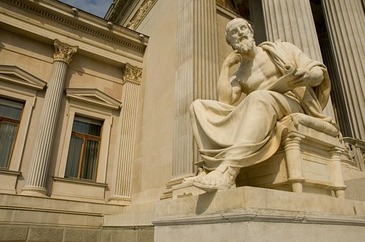



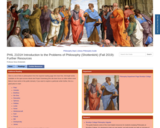
Students will gain a basic understanding of the broad discipline of philosophy.
Students will develop their ability to write and verbally communicate their ideas; in general, they will be able to formulate an argument in support of or in opposition to a claim, and specifically, they will be able to formulate an argument in relation to key philosophical questions with regard to the issues examined in the course.
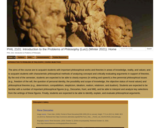
Survey of basic philosophical problems and different solutions proposed by philosophers. Such topics as the nature and scope of knowledge, meaning and verification, the existence of God, determinism and free will, the mind-body problem, and the nature of moral judgments. Satisfies Pathways Flexible Core Individual and Society requirement. (Not open to students who are enrolled in or have completed Philosophy 1.2 or 3105 [2] or Core Studies 10 or CORC 1210.)
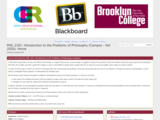
Is life worth living? Why? Or why not? What if the answer is 'maybe'? Why do we, human beings, struggle to answer this question? Why do we often answer by searching for the meaning of life? Why do we often say that a good life is happy or just or committed to doing what is good? Why do so many of us pursue wealth, fame, status or power instead?
In spite of all the ways in which our world is changing right now, these perennial questions of human living have become ever more relevant. Through the practice of philosophy, human beings investigate these questions in reasonable and sensible ways.
We will study major historical examples of Western philosophical inquiry into these questions, so that we can both:
learn about the intellectual history that has helped to shape some ways in which we view the world today and
develop our own skills for careful and methodical philosophical inquiry.
Students will learn to ask philosophical questions like the ones above, to articulate their own answers, to read and understand the way some philosophers have answered them in the past, and to revise or develop their own views in response.
We will aim to create a community of inquiry into these questions which are central to human experience.

Syllabus for Ethics at New York City College of Technology
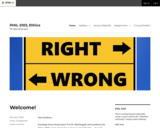
An examination of the major ethical theories on what is morally right and wrong, and the meaning of moral concepts (e.g., the concepts of moral obligation, right, duty). Focus is upon ethical problems such as capital punishment, aid to the needy, treatment of animals and plants, etc.


Introduces the philosophical frameworks used to guide ethical practice in the workplace. Using a case study approach, the course provides an analysis and critique of significant moral issues existing throughout business and industry in both domestic and international markets. Topics covered include classical and contemporary ethical theories, codes of professional conduct, issues such as consent and privacy, and environmental and social responsibilities at the personal, managerial, and organizational level.
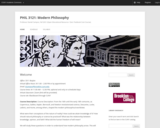
From the 16th until the early 18th centuries, as Copernicus, Galileo, Kepler, Bernoulli, and Newton revolutionized science, Descartes, Locke, Leibniz, and Hume, among others, shaped the modern philosophical worldview.
What were their conceptions of the nature of reality? How could we attain knowledge of it? How should natural philosophy or science be practiced? What was the relationship between knowledge, opinion, and faith? What did the human freedom of will mean?
We will study these questions in order to understand how modern philosophy arose. This will help us understand what it means to be philosophically “modern.”

Course Description: What is the relationship between truth, science, and religion? Is truth-seeking research the task of science exclusively or can other areas of human inquiry, such as philosophy and religion, also pursue truth? Are there different senses of “truth”? Is philosophy a search for “truths”? What is the function of ordinary and logical/mathematical languages in finding such “truths”? What is the relationship between these “truths” and politics and democracy?
We will discuss these questions in light of three philosophical traditions from the twentieth-century: analytic, pragmatist, and continental (European). We’ll see that these traditions often ask similar questions but deploy different methods of inquiry. We’ll read philosophers such as A.J, Ayer, Charles Peirce, William James, Bertrand Russell, Martin Heidegger, Hannah Arendt, and John Dewey. Their ideas will help us to develop our own philosophical understanding of these questions.

Can business be ethical? Should business decisions be guided by ethical considerations? If so, what kind of moral principles should inform ethical standards for business? We will attempt to answer these and other questions
pertaining to the conduct of individuals and groups involved in commerce.
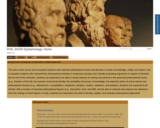
The aims of the course are to acquaint students with important philosophical works and theories in areas of knowledge, reality, and values; and to acquaint students with characteristic philosophical methods of analyzing concepts and critically evaluating arguments in support of theories. By the end of the semester, students are expected to be able to clearly express (in writing and speech) a few perennial philosophical issues (e.g., freedom of the will, the question of personal identity, the possibility and scope of knowledge, the objective status of moral values) and philosophical theories (e.g., determinism, compatibilism, skepticism, idealism, realism, relativism, and dualism). Students are expected to be familiar with a number of important philosophical figures (e.g., Descartes, Kant, and Mill), and be able to interpret and analyze key selections from the writings of these figures. Finally, students are expected to be able to identify, explain, and evaluate philosophical arguments.
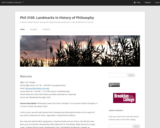
Philosophy means the “love of wisdom.” In its ancient Greek conception, it is a form of love. But what is love?
In this course, we will read classical and contemporary philosophical works on the nature of love and its relevance for ethics, especially in interpersonal relations.
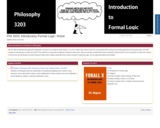
We are often presented with arguments designed to convince us to believe certain things, or to act in certain ways. Most of the time we do pretty well at sorting out the bad arguments from the good ones, but what exactly are the grounds on which we do this? One criterion is surely that an argument should be valid, that is, that its conclusion should follow from its premises. But just what is it for an assertion to follow from others? In this course we will develop a formal framework within which validity, along with other central concepts of deductive logic, can be rigorously defined and studied.
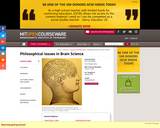
" This course provides an introduction to important philosophical questions about the mind, specifically those that are intimately connected with contemporary psychology and neuroscience. Are our concepts innate, or are they acquired by experience? (And what does it even mean to call a concept 'innate'?) Are 'mental images' pictures in the head? Is color in the mind or in the world? Is the mind nothing more than the brain? Can there be a science of consciousness? The course includes guest lectures by Philosophers and Cognitive Scientists."
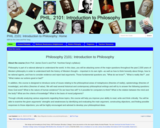
Philosophy is part of a rational attempt to understand the world. In this class, you will be attacking some of the major questions throughout the past 2,500 years of Western philosophy in order to understand both the history of Western thought— important in its own right—as well as how to think honestly about things, how to be rational agents, and how to consider evidence and reject bad arguments. Those fundamental questions are, "What do we know?", "What is reality like?", and "What makes our actions good or bad?"
In addition, this course is designed to introduce some of issues relating to the philosophical areas of metaphysics (theories of reality), epistemology (theories of knowledge), and ethics (theories of value). We will read several historical and contemporary philosophical writings and will try to answer the following questions: Does God exist? What is the nature of human existence? Do we have free will? Is it possible for computers to think? What is the relation between the mind and the body? What are the criteria of knowledge? What is the basis of moral judgments?
Through critically analyzing various arguments regarding those topics, this course will help you improve your ability to read, write and think critically. You will be able to examine the given arguments’ strengths and weaknesses by identifying and evaluating the main argument, constructing objections, and finding possible responses to those objections; you will be highly encouraged and advised to develop your philosophical ideas.

A short introduction to philosophy in a historical perspective, the resource contains short introductions and excerpts from primary readings from western philosophical thinkers ranging from Socrates until today.
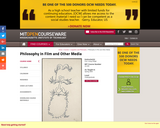
Works of film examined in relation to thematic issues of philosophical importance that also occur in other arts, particularly literature and opera. Emphasis on film's ability to represent and express feeling as well as cognition.